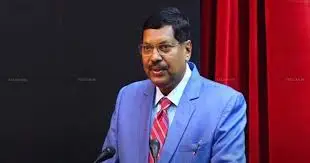Pleas challenging Waqf Act to come up before bench led by next Chief Justice of India B R Gavai on May 15

Supreme Court to Hear Waqf Act Challenge on May 15 Under New CJI B.R. Gavai
The Supreme Court of India will hear a series of petitions on May 15 that challenge the recent amendments to the Waqf Act. This hearing will be the first major case under the leadership of Justice B.R. Gavai, who assumes office as the 51st Chief Justice of India on May 14.
Justice Gavai will begin his tenure by taking up a highly sensitive matter that could redefine how religious properties are managed in India.
Why the Waqf Act Amendments Sparked Controversy
The Waqf (Amendment) Act, 2025 introduced several changes to the original 1995 law. Critics believe these updates weaken the independence of religious endowments and allow more state control over waqf properties.
Key concerns include:
- Greater Role of District Collectors: Authorities can now play a larger role in declaring property as waqf land. Critics say this opens doors to government overreach.
- Scrapping of ‘Waqf by Usage’ Clause: Many properties traditionally considered waqf could now lose that status if they lack documentation, even if they have served religious or charitable purposes for years.
- Application of the Limitation Act: The revised law allows adverse possession claims over waqf lands. Many fear this change could result in the loss of community-owned properties.
Who Filed the Petitions?
Over 150 petitioners have challenged the amended law. These include state-level waqf boards, legal associations, religious organizations, and concerned citizens.
The All India Muslim Personal Law Board is one of the key petitioners. Alongside them, several opposition leaders and community groups argue that the law violates Article 26 of the Indian Constitution. This article protects the rights of religious groups to manage their own affairs.
Supreme Court’s Approach So Far
Earlier, the court decided not to stay the law’s implementation. Instead, the bench chose to hear all challenges together for a more complete analysis.
The central government supports the amendments. It claims the changes aim to reduce property misuse and bring more transparency to waqf management.
However, community groups argue that the law singles out Muslim institutions. They point out that similar rules don’t apply to other religious trusts.
By assigning the case to a bench led by the incoming Chief Justice, the Supreme Court has shown that it considers the issue serious and urgent.
What Will Happen on May 15?
This hearing will be Justice Gavai’s first big constitutional test as Chief Justice. Legal experts expect the court to focus on three major questions:
- Do the amendments violate religious freedom under the Constitution?
- Do they unfairly target Muslim institutions?
- Should waqf property face the same rules as private property in civil disputes?
Because of the number of petitions and the complexity of the issues, the court may need several hearings before reaching a decision. Experts also expect the bench to hear arguments from senior advocates, religious scholars, and possibly independent legal experts.
Broader Impact on Society
This case goes beyond legal debates. The verdict could affect how minority communities manage their assets. It may also influence land disputes in states with a large number of waqf properties such as Maharashtra, Uttar Pradesh, Tamil Nadu, and Karnataka.
Many religious and civil groups see this case as a test of how India treats the property rights of its minorities. They worry the changes could lead to the erosion of centuries-old religious trusts.
Political analysts are also paying close attention. The judgment may impact voter sentiment in minority-dominated areas ahead of local and national elections.
Conclusion
As Justice B.R. Gavai prepares to take charge, the Supreme Court will begin a crucial hearing that could redefine the legal framework around waqf properties. The May 15 session promises to be a turning point in the balance between state oversight and religious freedom in India.






